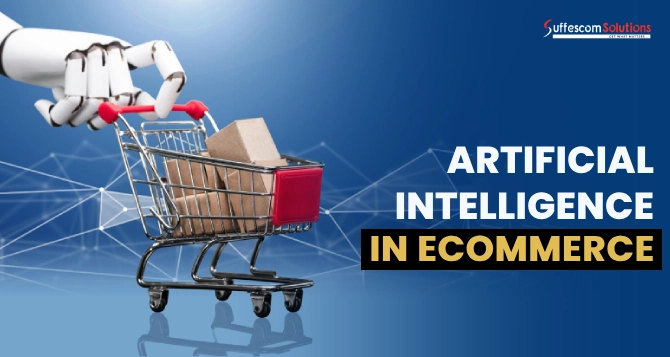AI In Ecommerce: How Artificial Intelligence Transforming Business

Market success in eCommerce apps demands AI implementation for those with eCommerce platforms or planning to establish new ones. Staying ahead of competitors has become essential because it is no longer optional. Industry data shows that the AI-enabled eCommerce market will grow to $22.60 billion by 2032 while maintaining a 14.6% CAGR from 2023 to 2032. Current market research suggests the market value will stand at $7.57 billion in 2024.
Artificial Intelligence serves as a core foundation in present-day eCommerce operations, where it develops business intelligence capabilities while enhancing pricing optimization solutions. Businesses that implement AI applications for eCommerce operations gain an advantage through improved operational efficiency and enhanced user experiences, which helps startups overcome competition. Your business can improve its AI solutions by hiring expert Artificial Intelligence developers to add ML/AI abilities and market best practices and consumer needs. An entrepreneur with foresight should realize that artificial intelligence provides a valuable tool when building an eCommerce website. A professional ecommerce app development company will help you get things done for your existing business.

Business Impact and Market Growth
AI development services in E-Commerce create advantages for businesses by bringing individualized shopping features and raising total sales numbers. The analysis indicates that AI-enabled e-commerce tools generate $7.57 billion in market value, increasing to $22.6 billion in 2032 as the industry grows at a 14.6% CAGR.
The use of AI technologies helps ecommerce companies improve customer relationships through better service delivery alongside operational efficiency improvements, resulting in superior market performance.
Chatbots and Virtual Assistants in eCommerce
Virtual assistants and chatbots enable fundamental changes to customer service operations in online businesses. AI with NLP and generative AI technology enables these systems to understand and interact with customers through inquiries, which enhances efficiency in online buying processes.
The technology enables simple deal processing and order management with personalized recommendations. Your customers who use any platform, including online shopping, store visits, and mobile applications, can experience unified communication through AI-enabled tools. Your eCommerce business will experience multiple advantages from the implementation of chatbots and virtual assistants as follows:
Collect Valuable Customer Data
The digital assistants and bots collect essential customer data, including preferences, size information, and question sources. Businesses use this customer information to develop better products while delivering individualized service through adjusted responses.
Improve the Checkout Process
The checkout page accepts chatbot integration so customers can ask questions about their purchase until they finish their transaction without abandoning their cart. Such ease of access reduces cart abandonment behavior, increasing product conversions.
Provide 24/7 Support
AI-powered chatbots never sleep. Such systems deliver instant responses to customer queries throughout all hours, thus enabling human representatives to handle more intricate tasks. Implementing a chatbot streamlines operations while creating higher customer contentment through immediate issue response options.
Leverage AI for Smarter Shopping Experiences – Talk to Our Experts Now!
Revolutionize your eCommerce platform with AI-driven automation, personalized recommendations, and predictive analytics. Stay ahead of the competition—start integrating AI today!
Types of AI Technologies for Ecommerce
Artificial intelligence (AI) is revolutionizing the ecommerce industry by enhancing search capabilities, improving customer experience, and optimizing business operations. Below are some of the Best AI for ecommerce:
Natural Language Processing (NLP)
Natural language processing, which serves as both an AI and machine learning subfield, allows computers to interpret human spoken and written speech. NLP technology drives e-search engines to deliver better customer results by enhancing their ability to understand user questions.
The main NLP capabilities that enhance ecommerce operations consist of:
Synonym recognition within the system enables matching physically similar terms (sofa versus couch) during search operations.
The search tool performs a typo correction that maintains proper results when users enter "backpacks" and similar terms return "backpacks" listings during their search.
The process of stemming enables search engines to find bare word roots, thus expanding results to match "swim," "swimming," and "swimmer" when users query "swimming.
Generative AI
Generative AI technology produces content through large language models, generating different forms such as texts, images, audio, and videos. The following domains within ecommerce benefit from this technology:
- The system assists companies that work with many products in creating accurate, engaging product descriptions automatically.
- The integration of AI technology enables chatbots to deliver individualized responses while detecting customer sentiment and recommending suitable products through continuous automated customer support.
Machine Learning (ML)
AI development services and ML enable ecommerce platforms to adjust their operations by studying customer data, which causes recommendations to improve continuously.
- ML processes browsing and purchase data to generate customized customer product recommendations.
- E-commerce retailers utilize past purchase behavior to provide complementary product suggestions during checkout, thus supporting cross-selling and upselling strategies (e.g., helping customers who are snowboard buyers receive wax, boot, sock, and helmet recommendations).
- ML identifies irregular activities through behavior pattern analysis to reduce fraudulent purchases effectively.
Deep Learning
Deep Learning represents a complex subset of ML, which functions similarly to the human brain to process large datasets at high speed and precision through automated mechanisms.
- Through deep learning technology, e-commerce platforms develop better image search capabilities and add voice-activated shopping functionality.
- AI systems accomplish automated product classification, enhancing platform search and organizational management capabilities.
- Analyzing customer sentiment through deep learning processes and customer evaluations to assess satisfaction levels and pinpoint performance weaknesses.
Computer Vision
The AI technology known as Computer Vision lets machines transform image and video visual data into processed information. The following AI technology benefits ecommerce operations:
- Visual search functionality allows customers to find products by uploading images instead of using written keywords.
- Using AI-driven Augmented Reality for shopping lets customers digitally try products like furniture or clothing before purchasing.
- AI conducts automated image analysis to produce tags that improve product discoverability through search functions.
Predictive Analytics
Using AI algorithms and artificial intelligence in ecommerce, predictive analytics examines historical data to accurately forecast customer patterns and market developments.
- The system predicts that the market needs to enable businesses to maintain proper stock amounts, preventing product surplus and shortages.
- Product prices adjust automatically in real time depending on market demand, competitor pricing strategies, and other influencing elements.
- The system detects which customers will likely leave and recommends individualized plans to return them.
Robotic Process Automation (RPA)
Ecommerce operation tasks that are repetitive and time-consuming get automated through RPA development, which uses AI-driven bots to streamline processes.
- The automation of order processing work enables businesses to eliminate the need for manual labor that handles orders, invoicing tasks, and shipment tracking.
- AI-powered automated systems function to address frequently asked customer concerns so employees can dedicate their efforts to complicated operations.
- The system processes returns by automating the return request handling and performing automated refund operations.
Voice Commerce
Ecommerce app developers help you develop AI-based voice recognition, the foundation of voice commerce, which lets users shop by issuing voice commands.
- Voice-command-enabled product searching systems let customers find items by speaking through smart speakers and mobile assistants.
- Users receive improved shopping convenience through hands-free ordering because they do not need to type to place their orders.
- Users can gain customized recommendations through AI-based assistants by permitting these systems to memorize purchasing data and preferences.
APIs and Composable Architectures to Increase System Value
The growing ecommerce ecosystem consists of multiple components that serve specific functions, such as search, recommendation engines, and payment gateways. These components can be integrated through APIs, enabling a composable commerce approach.
- Composable commerce – A flexible, modular approach that allows businesses to build and customize their ecommerce solutions using best-of-breed technologies.
- API integration – Ensures seamless connectivity between various AI-powered tools, improving overall system efficiency and functionality through robust API integration.
Advantages of Using Artificial Intelligence in Ecommerce Companies

Visual Search
Users can upload pictures to visual search technology, which reveals comparable items that match color patterns, brand characteristics, and design attributes. The four significant platforms, including Amazon, Google, Bing, and Pinterest, integrate visual search tools, while Google Lens is the best example. Home decor and fashion are the key industry sectors that gain from this technology because visual appeal is their primary requirement.
Foresight Marketing
Your eCommerce store can predict customer requirements before they make any requests. Through AI customer behavior analysis, Foresight marketing establishes forecasting capabilities to identify forthcoming customer needs. AI analyzes previous customer activities to show you how you can display your products and set prices, plus market your business in ways that attract customers, resulting in higher sales.
Personalization
The power of personalization has existed for a while, yet AI delivers an elevated version of it. Brands like "Harry" send you message notifications that directly state, "Harry, your cart is waiting for you," or "Exclusively for You." AI allows eCommerce companies to establish marketing solutions specific to individual customers through cross-platform data monitoring. Experts recognize that personalization stands at about 70% while believing it will improve because of AI; therefore, this technology delivers essential personalization for customers.
Dynamic Pricing
Operational price setting through manual input requires extensive work when fundamental inventory levels and market conditions evolve. AI-powered algorithms simplify pricing through real-time adjustments according to data concerning demand patterns, market competition, and industry trends. Companies use such methods to maintain their market competitiveness and achieve maximum profitability.
Examine the forthcoming changes in AI technology to ensure business success. You should join us to discover the future trends of Artificial Intelligence and its available business development prospects.
Better Customer Service
AI-powered chatbots have transformed current eCommerce customer service operations. These virtual assistants attract customers and solve their questions while offering continuous support. Using chatbots allows customer service personnel to concentrate on complicated matters, which results in better operational efficiency throughout customer interactions.
Product Recommendations
AI produces higher sales by generating helpful product suggestions for customers. AI makes product recommendations based on previous customer orders alongside other available data points. Product recommendations enabled by this approach would allow businesses to increase sales and enhance their eCommerce Average Order Value.
Fraud Detection & Prevention
Digital transactions have generated more security threats and online fraud incidents. Combining AI and machine learning technology enables real-time fraud detection and prevention through pattern analysis capabilities. The technology works as a shield to protect your eCommerce system against cyber dangers, thus securing your business operations and customer data.
eCommerce Automation
Managing an online shop requires numerous activities, and AI technology allows for automation. Artificial Intelligence enables the automation of different operations, such as product posting and customer assistance, enhancing efficiency and decreasing resource utilization. Operation efficiency remains steady through automation, so business owners can dedicate their focus to strategic expansion plans.
Use Cases of AI in eCommerce

Personalized Shopping Experience
AI-driven recommendation engines utilize collaborative filtering, deep neural networks, and reinforcement learning to analyze user behavior, purchase history, and preferences. These models dynamically suggest products, optimize pricing strategies using demand-based forecasting, and enhance cross-selling and upselling techniques by leveraging real-time consumer insights.
AI Chatbots and Virtual Assistants
Ecommerce app developers use NLP models like GPT and BERT, and AI chatbots provide human-like interactions, resolve queries, and automate customer service operations. These bots handle FAQs, assist in processing orders, track shipments, and offer personalized product suggestions, improving overall customer satisfaction and engagement.
Visual and Voice Search
Leveraging convolutional neural networks (CNNs) and speech recognition models, AI enables users to search for products through image uploads or voice commands. Technologies like Google Vision AI and Amazon Rekognition analyze product images, helping match them with the most relevant items in an eCommerce catalog and simplifying product discovery.
Fraud Detection and Security
AI enhances security by detecting fraudulent transactions through anomaly detection, pattern recognition, and machine learning algorithms. Real-time analysis of transaction behavior helps identify suspicious activities, reducing the risk of payment fraud and unauthorized access, while AI-driven risk assessment models strengthen overall cybersecurity.
Inventory Management and Demand Forecasting
Predictive analytics powered by AI helps retailers maintain optimal stock levels by analyzing historical sales data, market trends, and seasonality. Machine learning algorithms like ARIMA and LSTMs forecast demand accurately, preventing stockouts and overstocking while optimizing supply chain operations.
Automated Product Descriptions and Content Generation
Natural language generation (NLG) models automate the creation of SEO-optimized product descriptions, blog content, and social media posts. AI-driven copywriting tools streamline content marketing efforts by maintaining consistency, improving engagement, and enhancing product visibility across digital channels.
Smart Logistics and Supply Chain Optimization
AI optimizes logistics using route optimization algorithms, demand prediction, and real-time tracking. Machine learning models analyze traffic, weather conditions, and delivery constraints to suggest the most efficient routes, reducing shipping costs and improving delivery times. AI-powered warehouse automation further enhances efficiency with robotics and IoT integration.
Customer Sentiment Analysis
NLP techniques process vast customer reviews, social media comments, and support interactions to analyze sentiment and brand perception. AI models categorize feedback as positive, negative, or neutral, helping businesses make data-driven decisions to improve products and customer experience.
Augmented Reality (AR) for Virtual Try-Ons
AI-powered AR applications enable customers to try on clothes, makeup, and accessories virtually, enhancing confidence in purchase decisions. By leveraging computer vision and deep learning models, AR app development provides real-time rendering and realistic simulations, reducing return and improving conversion rates.
Retargeting and Predictive Analytics for Marketing
AI-powered predictive analytics analyze customer behavior, purchasing patterns, and engagement metrics to refine marketing strategies. Programmatic advertising and AI-driven recommendation engines personalize ad targeting, improving conversion rates and return on ad spend (ROAS). Dynamic retargeting algorithms enhance customer re-engagement by delivering hyper-personalized content across multiple channels.
Also Read - eCommerce App Development in 2026: Cost, Steps & Essential Features
How to Implement Artificial Intelligence Into Ecommerce
The Implementation Strategy for Incorporating Artificial Intelligence in Ecommerce Generative AI solutions in eCommerce operations deliver multiple business capabilities that improve supply chain operations and personalize customer experiences.
Create a Strategy
You have to start somewhere - and your strategy will lay out the path you need to take from there to your AI goal. Don't just punt this to a newly hire AI developer or your CIO or CTO. Put some thought into what you require to accomplish with AI. Take a practical approach, and don't forget to start small. You can always build on your successes down the road.
Find narrow use cases that apply to the overall corporate plan.
The most thriving AI use cases revolve around business purposes, data differentiation, and readily available artificial intelligence models. All that to say — you should focus on revenue-generating opportunities with a data advantage and in a context suitable for established AI technology.
Leverage Third-Party Expertise
You'll want to accept expert assistance even if you're an armchair AI Aficionado. Bring in a tiger team on a project or part-time basis to dig in and help you build a strategic AI roadmap.
Build a Full-scale solution
Once you're confident in what your team has produced, it's time to build the full-scale solution. Don't be surprised if it still takes some iterations before it works as you expected. As you and your team become more comfortable working in AI, you'll see more significant benefits from the projects you implement.
Transform Your eCommerce Business with AI – Get Started Today!
Unlock the power of AI in eCommerce to enhance customer experiences, streamline operations, and drive higher conversions. Explore cutting-edge AI solutions tailored to your business needs!
Final Note
Artificial Intelligence is reshaping eCommerce by streamlining operations, enhancing customer experiences, and driving revenue growth. With AI-powered solutions like personalized recommendations, chatbots, predictive analytics, and smart logistics, businesses can optimize their online platforms for efficiency and scalability. As AI evolves, staying ahead of emerging trends will be crucial for maintaining a competitive edge in the digital marketplace.
For businesses looking to leverage AI in eCommerce, the key lies in strategic implementation, expert collaboration with AI development company and continuous innovation. By embracing AI-driven technologies, companies can unlock new opportunities, improve customer engagement, and future-proof their business models for sustained success in the ever-evolving eCommerce landscape.
FAQs
1. How does AI improve the customer experience in eCommerce?
AI enhances customer experience by providing personalized product recommendations, 24/7 chatbot support, seamless checkout processes, and predictive analytics for better service and product offerings.
2. What AI technologies are commonly used in eCommerce?
Common AI technologies in eCommerce include machine learning, natural language processing (NLP), computer vision, predictive analytics, generative AI, and robotic process automation (RPA).
3. How can AI help reduce cart abandonment?
AI reduces cart abandonment by integrating chatbots for instant customer support, sending personalized reminders, offering real-time discounts, and streamlining checkout with predictive autofill and payment solutions.
4. Is AI implementation in eCommerce expensive?
AI implementation costs vary depending on the complexity and scale of integration. However, businesses can start with cost-effective AI solutions like chatbots and recommendation engines before scaling up with more advanced AI tools.







